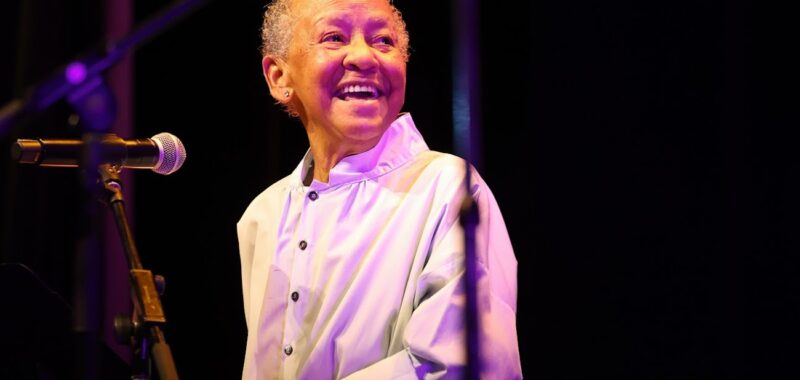The trailblazing poet, artist, educator, and lifelong activist Nikki Giovanni, known as the “Princess of Black Poetry,” died on Monday, December 9 at a hospital in Blacksburg, Virginia. She was 81. Giovanni’s publicist told local reporters that she passed away after complications related to lung cancer with her wife, Virginia “Ginny” Fowler, by her side.
Born Yolande Cornelia Giovanni Jr. on June 7, 1943, in Knoxville, Tennessee, she grew up between her birthplace and Ohio and attended Fisk University, graduating in 1967. In the wake of the death of her grandmother and the assassination of Martin Luther King Jr. the following year, she began writing poetry to process her grief. Giovanni went on to publish over 20 poetry collections and more than a dozen illustrated children’s books, winning numerous prizes including the inaugural Rosa Parks Woman of Courage Award in 2002. Her best-known works include her first three poetry collections, Black Feeling, Black Talk (1968), Black Judgment (1968) and Re: Creation (1970), which drew inspiration from her key role in the Black Arts Movement of the 1960s and ’70s, when Black American intellectuals and artists of various disciplines used their work to celebrate African-American culture and create new community spaces focused on self-determination.
It was also during this period that Giovanni had a historic multi-topic conversation with writer James Baldwin for the public television program Soul! Originally filmed in London in 1971, the episode was later transcribed and adapted into the collaborative book A Dialogue (1973) and continues to resonate decades later for its illuminating questions and candid commentary on subjects spanning race, gender, and politics.
“An educator, activist, and iconic poet, Nikki Giovanni challenged us to examine love, revolution, and what it means to be human — all while being a beacon of light to anyone who met her, including me,” Joy Bivins, director of the Schomburg Center for Research in Black Culture in New York City, told Hyperallergic.
“Each of us had our own treasured Nikki Giovanni work that not only lifted our spirits but reminded us to use our own voices to make change,” Bivins said.

In 2023, Giovanni was the subject of Michèle Stephenson and Joe Brewster’s biographical documentary Going to Mars: The Nikki Giovanni Project. The poet made headlines earlier this year when she joined the filmmakers and writer Doreen St. Félix in boycotting a scheduled screening and discussion around the film at the Brooklyn Museum to protest the institution and its program partner, PEN America, for their alleged silence on Israel’s ongoing attacks on Palestine.
“I stand with my producers and understand pain. I hope peace and the prayers for peace will be answered,” Giovanni told Hyperallergic in March.
In addition to her poetry and activism, Giovanni is widely recognized for her children’s works, including the illustrated biography Rosa (2005) about Civil Rights activist Rosa Parks, whom Giovanni knew personally. She also produced several nonfiction works and essays, edited anthologies, and created multiple audio recordings merging spoken-word poetry with music, such as Truth Is On Its Way (1971), Like a Ripple on a Pond (1973), and The Way I Feel (1975). More recently, Giovanni published Make Me Rain: Poems & Prose (2020), which celebrates her Black heritage while also delving into the enduring effects of racism and white nationalism. Her final collection of poetry, The Last Book, is slated to be released next year.
“My dream was not to publish or to even be a writer: My dream was to discover something no one else had thought of. I guess that’s why I’m a poet. We put things together in ways no one else does,” Giovanni wrote on her website.
In addition to her literary contributions, Giovanni held teaching positions at Rutgers University and Queens College before taking a job at Virginia Polytechnic Institute and State University, where she met Fowler, who became her life partner. The couple later married in 2016.
Her commitment to advocacy is what inspired artist Robert Shetterly to paint her portrait for his Americans Who Tell the Truth series (2002–ongoing), which pays tribute to past and present American truthtellers. Shetterly told Hyperallergic that he included her in his project “because of her fearless insistence of telling the truth about racism and misogyny in this country.”
“The power and precision of her words were like an arrow into our stubborn, unwoke hearts,” Shetterly said.
In addition to Fowler, Giovanni is survived by her only child, Thomas Watson Giovanni, and a granddaughter, according to the New York Times.
“We mourn this profound loss and find comfort in the fact that Nikki Giovanni’s incredible words are a legacy that will continue to heal, delight, and inspire generations to come,” Bivins said.

